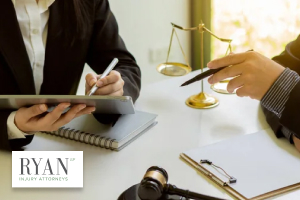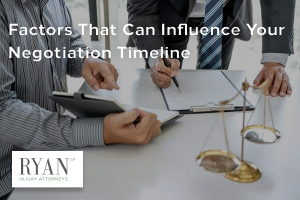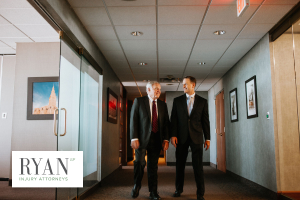
The settlement negotiation process can be complex and overwhelming when you're involved in a car accident. We will walk you through what to expect during these negotiations, providing clarity and support. We'll cover everything from initial contact with insurance companies to finalizing the settlement.
Ryan LLP specializes in guiding clients through car accident settlements. Our experienced team is here to help you navigate this process. We understand that this can be stressful, and our goal is to make it as smooth as possible. You need a personal injury lawyer to help you with your personal injury claim. Our car accident attorney can negotiate with the car insurance company or insurance adjuster on your behalf.
Contact us today to schedule a free consultation to discuss your car accident claim or personal injury lawsuit.
A car accident settlement negotiation starts when you or your attorney contacts the insurance company to claim compensation. This process involves discussing the details of the accident, your injuries, and the damages you've incurred. The goal is to reach an agreement on a fair settlement amount that covers your losses without going to court.
Evidence plays a crucial role in these negotiations. Your attorney will present evidence like medical records, accident reports, and witness statements. The insurance company will assess this evidence alongside its own findings. Both parties aim to agree on the accident's impact and the compensation needed. You need someone with knowledge and experience in this area who can help you. Count on our legal team to be your advocates during this time.

A car accident settlement timeline can vary based on the case's complexity. Generally, negotiations begin once you have recovered enough to assess the full extent of your damages. This process can take weeks to several months, as it's essential to understand all the impacts of the accident.
We will keep you updated every step of the way. Feel free to reach out to us with any questions you might have. We will negotiate in your best interests throughout the duration of the case. While we want to help you get your compensation quickly, we also want to maximize the amount you recover.
Your first step is contacting the insurance companies involved. This contact usually happens soon after the accident. You'll need to provide basic information about the incident and your initial understanding of the damages.
After the initial contact, the insurance company will start its investigation. They'll review the accident report, speak with witnesses, and request your medical records. It's crucial to be honest but cautious with the information you provide. Your attorney can guide you on what to share and what to withhold.
Evaluating damages involves calculating the costs of your medical bills, lost wages, and other losses. This step can take time as you need accurate and comprehensive documentation of all expenses related to the accident. Your attorney will help gather and present this information.
Liability assessment is about determining who is at fault for the accident. This involves examining evidence like police reports, traffic camera footage, and witness statements. Your lawyer will work to prove the other party's liability while the insurance company may try to minimize their client's fault.
The demand letter is a crucial document. It details your injuries, the circumstances of the crash, and the amount of compensation you're seeking. This letter should be clear, concise, and backed by solid evidence.
Once you submit the demand letter, the insurance company will review it. They may accept your demands, reject them, or offer a counterproposal. This is where negotiations start, with your attorney advocating for your best interests.
You'll negotiate the settlement amount with the insurance company at this stage. This involves back-and-forth discussions, often led by your attorney. The goal is to reach an amount that fairly compensates you for your damages.
Insurance companies often start with a low offer. It's important not to accept the first offer without consulting your lawyer. They can help negotiate a higher amount based on the evidence and the extent of your damages.
Mediation involves a neutral third party who helps resolve disputes. This step is often used if negotiations with the insurance company stall. The mediator doesn't make decisions but helps both sides find common ground.
During mediation, each party presents its case. The mediator then works to facilitate a compromise. This process can be quicker and less expensive than going to court, making it an appealing option for many.
Understanding the car accident settlement process is crucial for a successful negotiation. This process involves several steps, each requiring careful attention and strategy.

A. The Strength of Your Case: A strong case with clear evidence can speed up negotiations, as the insurance company may be more inclined to settle quickly.
B. The Lowest Amount You'll Settle For: Knowing your bottom line is essential. If your minimum acceptable amount is reasonable and well-justified, it can streamline the negotiation process.
C. How Fast You Want to Reach a Settlement: Your urgency to settle can affect the timeline. Being open to negotiation can expedite the process, but rushing might result in a lower settlement.
D. Whether or Not You Have a Lawyer: Having an experienced attorney can significantly influence the timeline. Lawyers know how to navigate these negotiations efficiently and can prevent unnecessary delays.
A. Delaying Tactics: Insurance companies sometimes use delays to pressure claimants into accepting lower settlements. Be aware of unnecessary delays and consult your attorney.
B. Denial of Liability: Insurance companies may deny their client's liability to avoid paying. Your attorney will counter this by providing strong evidence of the other party's fault.
C. Downplaying Damages: Insurers often try to minimize the extent of your damages. Ensure all your losses are well-documented and presented by your attorney.
D. Lowball Settlement Offers: Initial offers are often lower than you're entitled to. Only accept the first offer after consulting your lawyer.
A. Accepting the Adjuster's First Offer: This is usually much lower than what you deserve. Always review offers with your attorney before accepting.
B. Signing a Blanket Medical Release: This could give the insurance company access to your medical history, which they could use against you. Only provide what's necessary.
C. Losing Your Temper: Staying calm and professional is crucial. Losing your temper can harm your case.
D. Overlooking Important Evidence: To strengthen your case, you need to include critical pieces of evidence. Make sure everything is accounted for.
E. Discussing Prior Injuries: Discussing unrelated past injuries can complicate your case. Focus on the injuries directly caused by the accident.
A. Always Have Good Documentation of Your Damages: Well-organized and comprehensive documentation strengthens your case.
B. Follow Through With Medical Treatment Guidelines: This shows that you're serious about your recovery and helps justify your medical expenses.
C. Review Your Car Insurance Policy: Understanding your policy can help you understand your rights and can guide your negotiations.
D. Be Patient but Persistent: Negotiations can take time. Patience is critical, but you also need to be assertive to get what you deserve.
E. Hire a Competent Attorney: An experienced attorney can navigate the complexities of settlement negotiations. Our team will advocate effectively on your behalf.
A. Documenting the Agreement: 1. Settlement Agreement Terms: The final agreement should clearly outline the settlement terms, including the amount and conditions. 2. Release of Liability: Signing this releases the other party from further claims related to the accident.
B. Receiving the Settlement Amount: 1. Lump Sum vs. Structured Payments: Decide whether you want a one-time payment or smaller, regular payments over time. 2. Tax Implications: Understand the tax implications of your settlement, as some portions may be taxable.

At Ryan LLP, we understand how challenging navigating a car accident settlement can be. Our compassionate team is prepared to walk you through every step. We will ensure your rights are safeguarded and you receive the compensation you deserve.
If you've been in a car accident, don't navigate this complex process alone. Contact us today to schedule a free consultation. Our car accident lawyers are here to help you understand your options and fight for your rights. Remember, time can be a critical factor in these cases, so don't hesitate.
Call Ryan LLP today to schedule a consultation with our team.